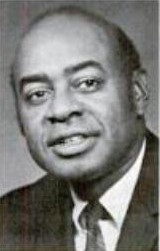W. Beverly Carter Jr. facts for kids
William Beverly Carter Jr. (born in 1921, died in 1982) was an important American diplomat. He worked for three different U.S. presidents. He served as the U.S. Ambassador to Tanzania and Liberia. He was also the first African American to be named "Ambassador-at-Large." This special role meant he worked with state and local governments.
Contents
A Life of Service
Beverly Carter was born in Coatesville, Pennsylvania in 1921. He grew up in Philadelphia.
From Newsman to Diplomat
Mr. Carter started his career as a journalist. He helped edit newspapers like the Philadelphia Tribune and "The Afro-American". Later, he became the publisher of the Pittsburgh Courier. This meant he was in charge of the newspaper.
In 1954, Carter tried to become a member of Congress for Pennsylvania. He won his party's primary election. However, he did not win the main election against the other candidate.
Carter was very interested in African countries. He first visited Africa in 1952. He later traveled to 40 different nations in Africa. Before becoming an ambassador, he worked for the United States Foreign Service. He served in Kenya shortly after it became independent. He also worked in Nigeria during the Biafra War. His early interest in Africa began when a friend from college, Kwame Nkrumah, invited him to visit Ghana. He went to see Ghana's early days of independence.
Ambassadorial Roles
From 1969 to 1972, Carter was a top official in the State Department. He focused on African affairs. On June 27, 1972, he was chosen to be the U.S. Ambassador to Tanzania. He served there until October 14, 1975.
On April 6, 1976, he became the ambassador to Liberia. He held this job until January 1, 1979. After that, on February 9, 1979, he was named "Ambassador at Large." In this role, he helped connect the U.S. government with state and local governments. His time in this role ended on January 16, 1981. Besides his official duties, he also worked for the United Nations. He was part of a group that worked to prevent discrimination and protect minorities. He did this from 1972 until he passed away.
Helping Others and Recognition
While he was ambassador to Tanzania, Mr. Carter was involved in helping to free four students. These students (three Americans and one Dutch) had been taken by a rebel leader in Zaire. The students' families helped negotiate their release. After they were safe, there was some discussion about how the release was handled.
However, after much public support and pressure, Ambassador Carter was given a new important role. He was assigned to be the ambassador to Liberia. Looking back, Carter said, "Once you start thinking of one life as different from a thousand lives, you've lost it all."
Ambassador Carter received high honors for his work. He was given the Distinguished Honor Award by the State Department. This is their highest award. He also received the Order of African Redemption from Liberia. This is Liberia's highest award for civilians. His official papers are kept at the Library of Congress.
Education
Carter earned a Bachelor's degree in biology from Lincoln University in 1944. He then earned his law degree from the Temple University Beasley School of Law in 1947. He also studied at the New School of Social Research in Manhattan.
Family
In 1946, Carter married Alice Rosalie Terry. They later divorced. In 1971, Carter married Carlyn Butler Brown. He had one son from his first marriage, William Beverly Carter III. He also had a grandson named Terence Sebekos Carter. His grandmother, Jennie Carter, was a well-known educator.
Death
Carter passed away on Sunday, May 9, 1982. He died from a heart attack at Suburban Hospital in Bethesda, Maryland.
| Diplomatic posts
|
||
|---|---|---|
| Preceded by Claude G. Ross |
U.S. Ambassador to Tanzania 1972–1975 |
Succeeded by James W. Spain |
| Preceded by Melvin L. Manfull |
United States Ambassador to Liberia 1976–1979 |
Succeeded by Robert P. Smith |


